Boiler Installation Whitburn
Top Boiler Replacement in Whitburn
Get multiple Boiler Installation quotes for your project today! Compare profiles, reviews, accreditations, portfolio, etc... and choose the best deal.
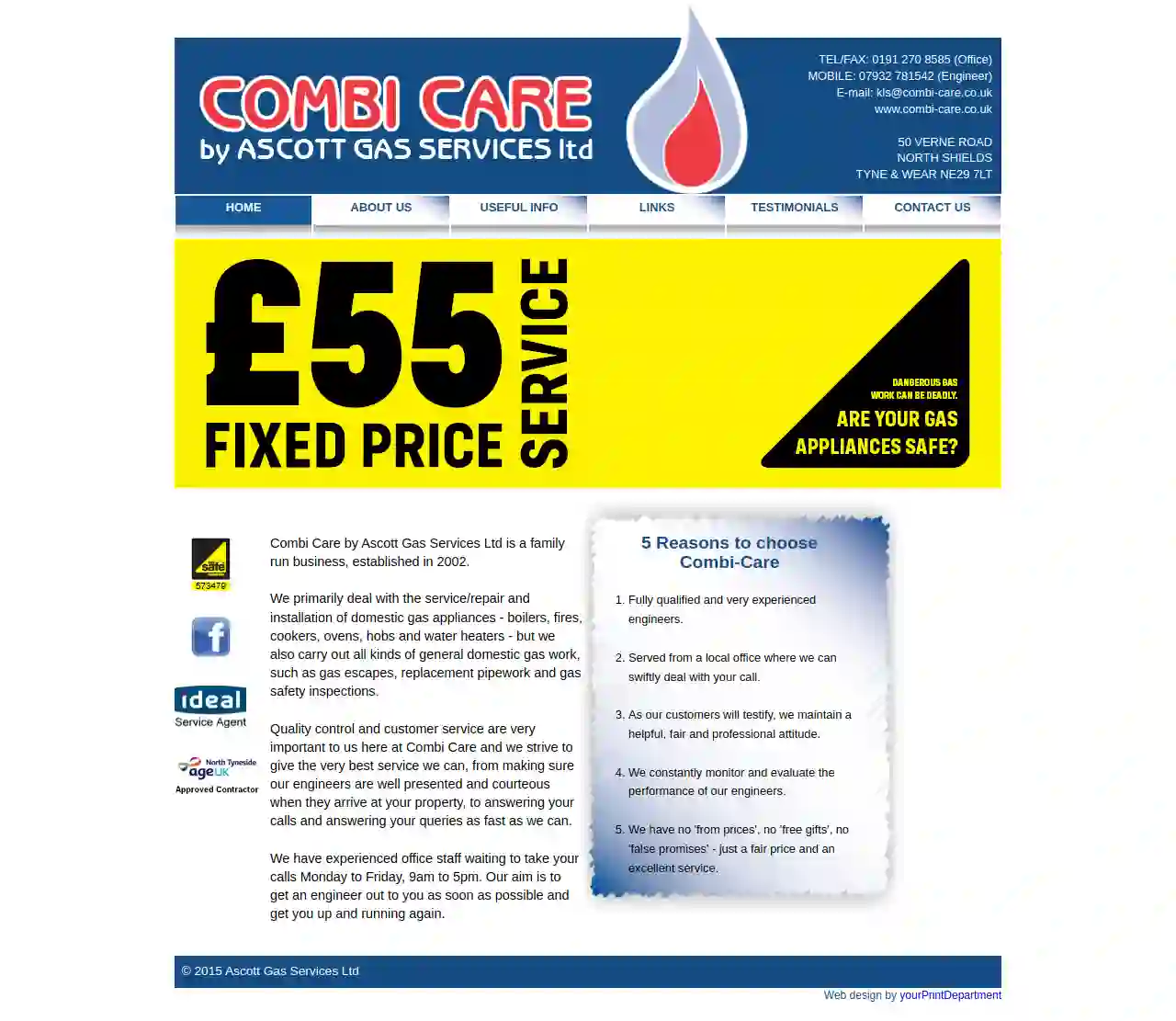
Combi Care
4.516 reviews50 Verne Road, North Shields, NE29 7LT, GBCombi Care by Ascott Gas Services Ltd is a family run business, established in 2002. We primarily deal with the service/repair and installation of domestic gas appliances - boilers, fires, cookers, ovens, hobs and water heaters - but we also carry out all kinds of general domestic gas work, such as gas escapes, replacement pipework and gas safety inspections. Quality control and customer service are very important to us here at Combi Care and we strive to give the very best service we can, from making sure our engineers are well presented and courteous when they arrive at your property, to answering your calls and answering your queries as fast as we can. We have experienced office staff waiting to take your calls Monday to Friday, 9am to 5pm. Our aim is to get an engineer out to you as soon as possible and get you up and running again.
- Services
- Why Us?
- Our Team
- Testimonials
- Gallery
Get Quote
Nationwide Heating & Cooling
4.52 reviews37 Atley Business Park, Cramlington, NE23 1WP, GBNATIONWIDE HEATING & COOLING Ltd are a leading HVAC contractor and provider of heating, ventilation, refrigeration and air conditioning engineering services for commercial and industrial sectors nationwide. The controlled indoor environments we provide ensure our clients' businesses are able to operate smoothly and efficiently. Based in the North East, Nationwide Heating & Cooling provides clients with innovative, efficient, cost-effective and added value sustainable solutions that encompass all aspects of mechanical engineering. We are a social and environmental responsible business and our aim is to add value to our clients' business and develop long-term partnerships. With the majority of our client base being repeat business, their loyalty is a testament to the support we provide in all aspects of the project life cycle. NATIONWIDE HEATING & COOLING - celebrating 10 years of providing complete turnkey mechanical services.
- Services
- Why Us?
- Accreditations
- Testimonials
- Gallery
Get Quote
Trident Air Conditioning Ltd
Lemington Road, Unit 7, Mandale Business Park, Newcastle upon Tyne, NE15 8BU, GBTrident Air Conditioning Ltd. was founded by Building Services Engineers with a combined 40+ years of experience in the HVAC industry. We strive to provide a complete service for the design, installation, maintenance, and repair of air conditioning, air source heat pumps, and ventilation systems throughout the UK. Our offices are located in Newcastle upon Tyne and Essex, with engineering personnel strategically positioned at both sites and in between, allowing us to offer a nationwide service. We work with end users, Main & M&E Contractors, and Consulting Engineers, aiming to provide a first-class service from the initial enquiry through installation to completion and beyond. As a REFCOM FGAS and Safe Contractor approved company, our specialist teams of installation and maintenance/service engineers, project managers, and support staff are fully committed to providing the very best solutions to our clients' needs, large or small. We take pride in our independence, allowing us to offer the most efficient and cost-effective solution for your specific requirements.
- Services
- Why Us?
- Accreditations
- Gallery
Get Quote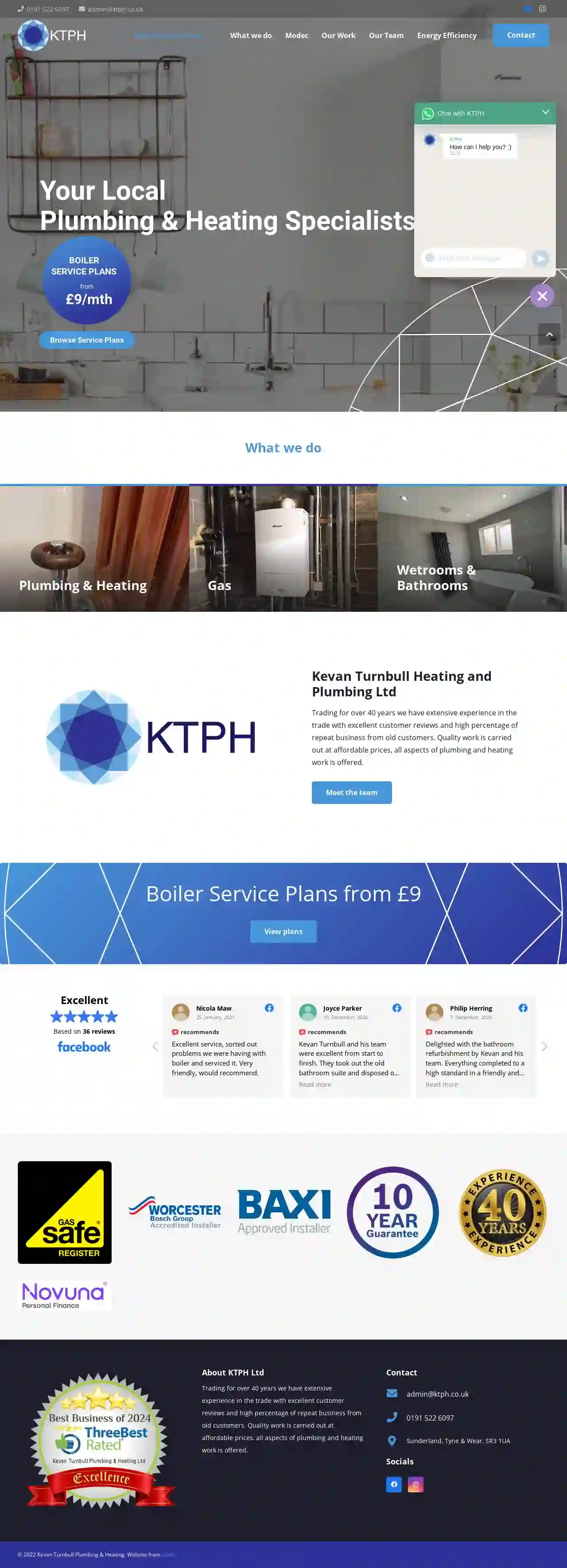
Kevan Turnbull Plumbing & Heating Ltd
4.832 reviewsSunderland, GB- Services
- Why Us?
- Gallery
Get Quote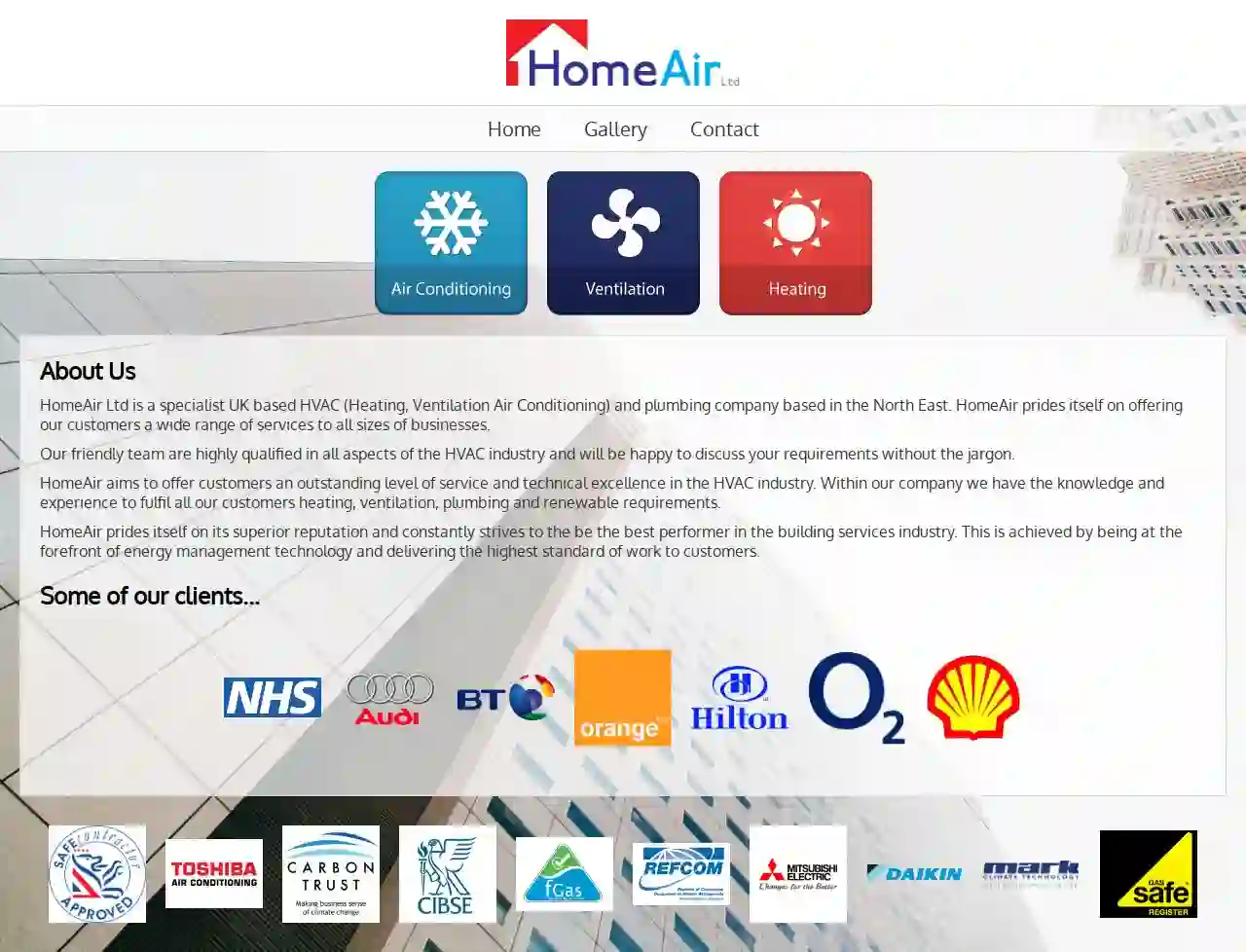
Home Air Ltd
Station Approach, Unit 1C, NE36 0AB, GBHomeAir Ltd is a specialist UK based HVAC (Heating, Ventilation Air Conditioning) and plumbing company based in the North East. HomeAir prides itself on offering our customers a wide range of services to all sizes of businesses. Our friendly team are highly qualified in all aspects of the HVAC industry and will be happy to discuss your requirements without the jargon. HomeAir aims to offer customers an outstanding level of service and technical excellence in the HVAC industry. Within our company we have the knowledge and experience to fulfil all our customers heating, ventilation, plumbing and renewable requirements. HomeAir prides itself on its superior reputation and constantly strives to be the best performer in the building services industry. This is achieved by being at the forefront of energy management technology and delivering the highest standard of work to customers.
- Services
- Why Us?
- Our Team
- Gallery
Get Quote
Turn Key Air Conditioning
53 reviewsGround Floor, 2 Apollo Court, Koppers Way, Monkton Business Park South, Hebburn, Tyne & Wear, NE31 2ES, GBTurn Key Air Conditioning Ltd is a specialist air conditioning contractors, operating within the built environment. Our forte is in working with end users, consultants and contractors, offering a comprehensive, turn key air conditioning service which includes: Concept to Completion, Survey, design, legal aspects, building trades co-ordination, contract supervision and air conditioning system installation and maintenance. We deal with the major air conditioning equipment suppliers such as Daikin and Toshiba and we are Diamond Partners to Mitsubishi Electric. We design, install and maintain air conditioning and ventilation systems for hotel, retail, leisure, commercial and manufacturing groups with premises throughout the UK.
- Services
- Why Us?
- Accreditations
- Our Team
- Gallery
Get Quote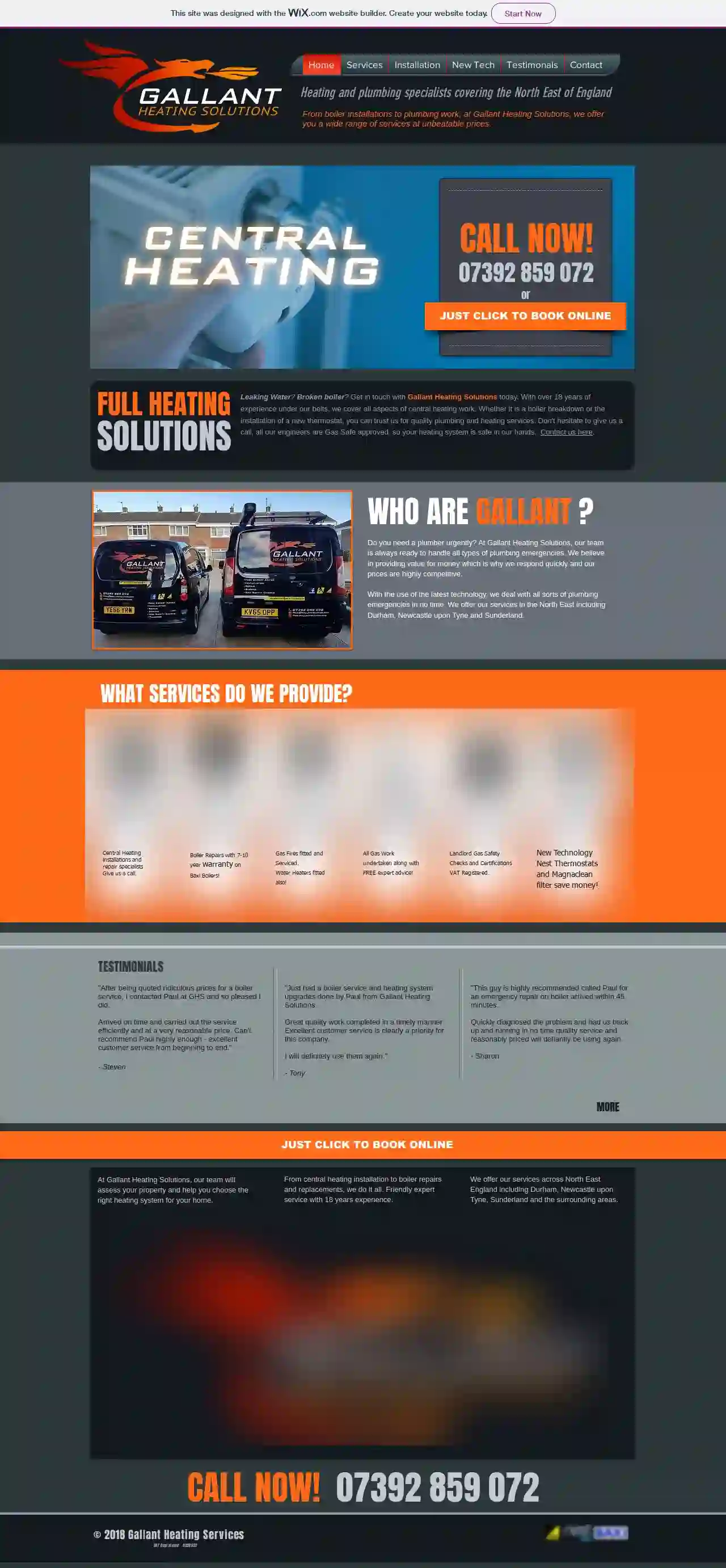
Gallant Heating Solutions
5149 reviewsNewcastle, GBAt Gallant Heating Solutions, we offer a wide range of services at unbeatable prices. From boiler installations to plumbing work, our team of experts has over 18 years of experience in providing quality plumbing and heating services. We are Gas Safe approved, ensuring your heating system is safe in our hands. We cover all aspects of central heating work, including boiler breakdowns, thermostat installations, and more. With our quick response times and competitive prices, you can trust us to get the job done right.
- Services
- Why Us?
- Our Team
- Testimonials
- Gallery
Get Quote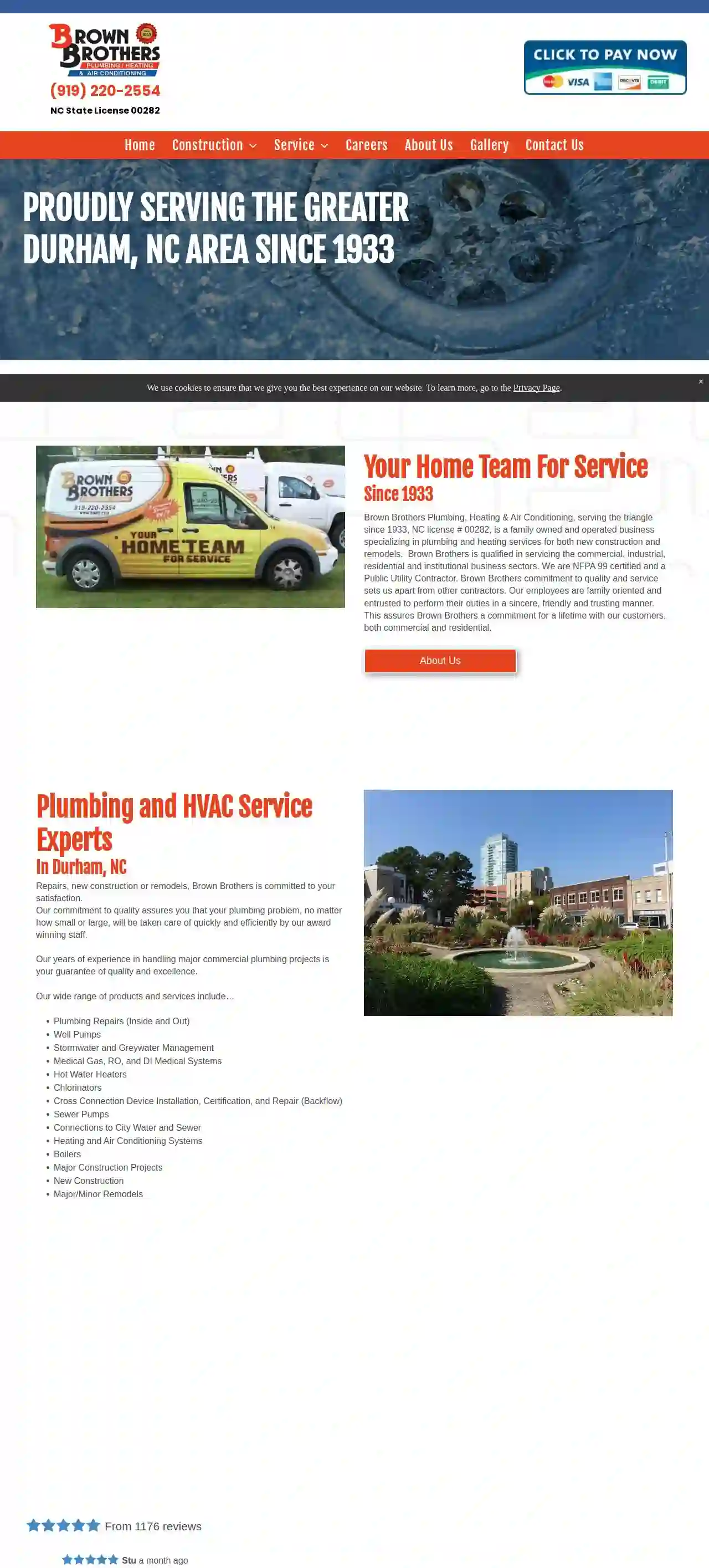
Brown Brothers Plumbing & Heating
4.92820 N Roxboro St, Durham, 27704, GBBrown Brothers Plumbing, Heating & Air Conditioning, serving the triangle since 1933, NC license # 00282, is a family owned and operated business specializing in plumbing and heating services for both new construction and remodels. Brown Brothers is qualified in servicing the commercial, industrial, residential and institutional business sectors. We are NFPA 99 certified and a Public Utility Contractor. Brown Brothers commitment to quality and service sets us apart from other contractors. Our employees are family oriented and entrusted to perform their duties in a sincere, friendly and trusting manner. This assures Brown Brothers a commitment for a lifetime with our customers, both commercial and residential.
- Services
- Why Us?
- Accreditations
- Our Team
- Gallery
Get Quote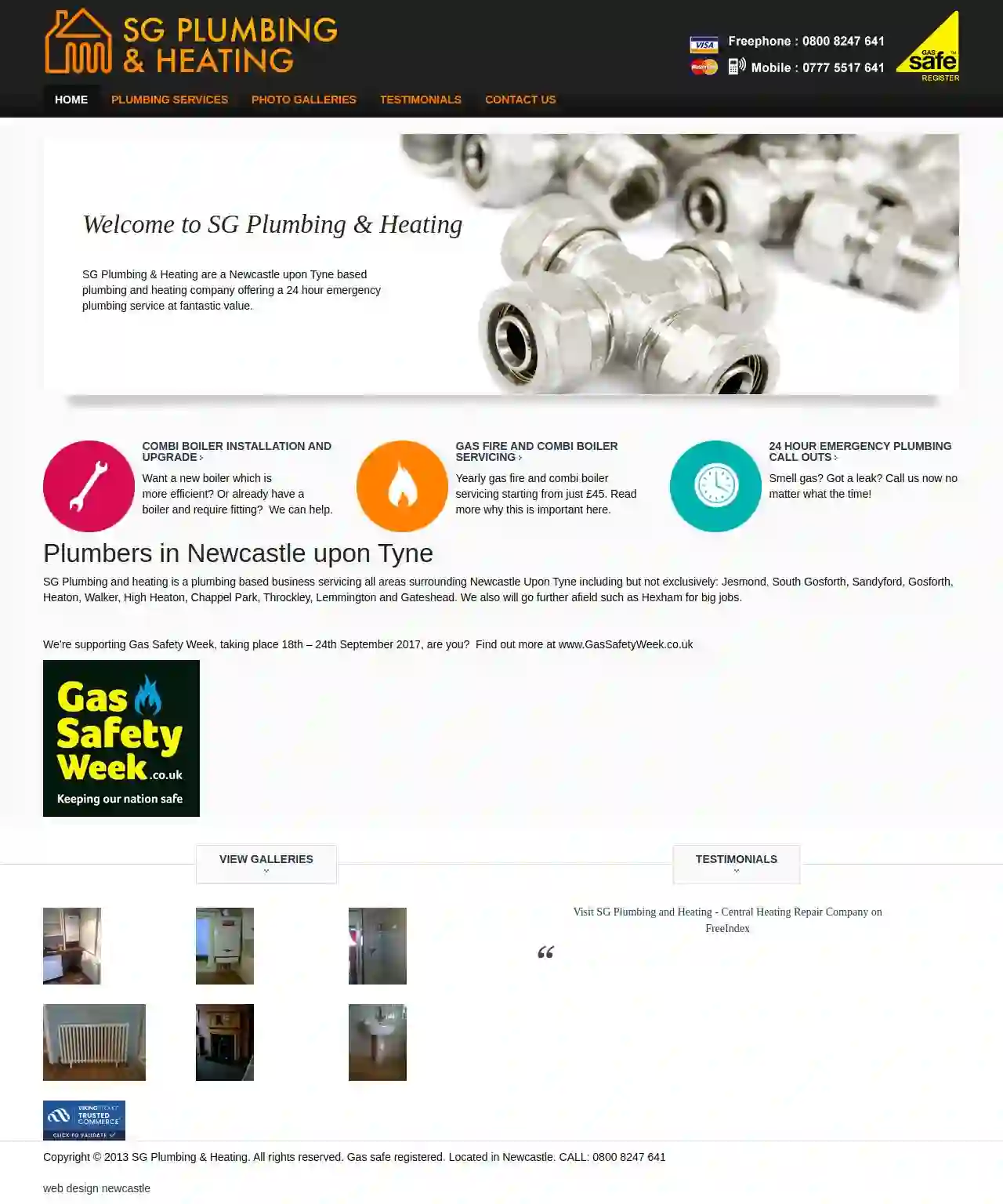
SG Plumbing Heating Svs
52 reviewsSandringham Road, SG House, South Gosforth, NE3 1QB, GBSG Plumbing & Heating are a Newcastle upon Tyne based plumbing and heating company offering a 24 hour emergency plumbing service at fantastic value. We can help with Combi boiler installation and upgrade, Gas fire and combi boiler servicing, 24 Hour emergency plumbing call outs. SG Plumbing and heating is a plumbing based business servicing all areas surrounding Newcastle Upon Tyne including but not exclusively: Jesmond, South Gosforth, Sandyford, Gosforth, Heaton, Walker, High Heaton, Chappel Park, Throckley, Lemmington and Gateshead. We also will go further afield such as Hexham for big jobs.
- Services
- Why Us?
- Testimonials
- Gallery
Get Quote
B&M Store
4.3Unit 1, The Links, Blyth, NE24 3AR, GBB&M Stores is a leading discount retailer in the UK, offering a wide range of products across various categories, including homeware, furniture, toys, food, and more. With over 600 stores nationwide, B&M provides customers with great value for money and a convenient shopping experience. The company is committed to offering a diverse selection of products at competitive prices, catering to the needs of families and individuals alike. B&M Stores prides itself on its friendly and helpful customer service, ensuring that shoppers have a pleasant and enjoyable experience.
- Services
- Why Us?
- Accreditations
- Testimonials
- Gallery
Get Quote
Over 12,692+ HVAC Companies on our directory
Our HVAC contractors operate in Whitburn & surroundings!
HVACCompaniesHub has curated and vetted the Best HVAC Businesses near Whitburn. Find the most reliable business today.
Frequently Asked Questions About Boiler Installation
- Age: If your boiler is more than 15 years old, it's likely to be less efficient and more prone to breakdowns. Newer boilers can significantly reduce energy bills.
- Frequent Repairs: Frequent repairs can be an indication that it is more cost-effective to replace your boiler. .
- Inconsistent Heating: If your boiler struggles to heat your home evenly , it could be failing.
- Leaks and Drips: Any dripping water around your boiler indicate a problem and should be addressed by a professional immediately. .
- Unusual Noises: Gurgling, rumbling, or clanking sounds coming from your boiler indicate a potential problem that needs investigating. .
- Increasing Energy Bills: A noticeable rise in your energy bills , even with no changes in temperature settings, could be a sign of a less efficient boiler. .
- Yellow Flame: If the flame in your gas boiler is yellow instead of blue, it could indicate incomplete combustion, a sign that your boiler may need to be serviced or replaced. A yellow flame can also mean a dangerous carbon monoxide leak, so have it checked immediately. .
How do I find a boiler installer near me?
How do I bleed my radiators?
How long does it take to install a boiler?
Do I need a new boiler?
How do I find a boiler installer near me?
How do I bleed my radiators?
How long does it take to install a boiler?
Do I need a new boiler?
- Age: If your boiler is more than 15 years old, you should probably consider replacing it. Newer boilers can significantly reduce energy bills.
- Frequent Repairs: Frequent repairs can be a sign that it is more cost-effective to replace your boiler. .
- Inconsistent Heating: If your boiler struggles to heat your home evenly , it could be failing.
- Leaks and Drips: Any water leaks around your boiler indicate a problem and should be addressed by a professional immediately. .
- Unusual Noises: Strange noises like banging, kettling, or whistling coming from your boiler indicate that it's not operating optimally.
- Increasing Energy Bills: A noticeable rise in your energy bills , even with no changes in temperature settings, could be a sign of a less efficient boiler. .
- Yellow Flame: If the flame in your gas boiler is yellow instead of blue, it could indicate incomplete combustion, a sign that your boiler may need professional attention Contact a technician right away.